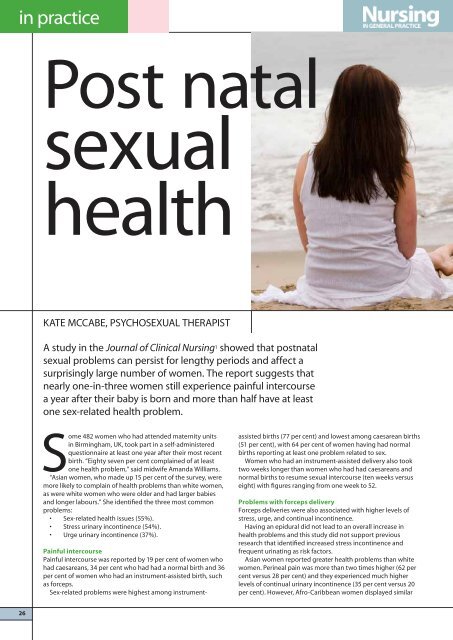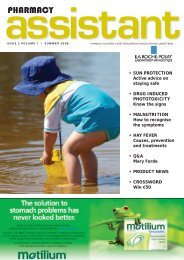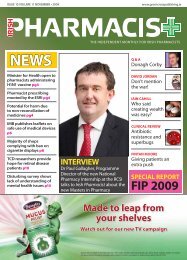veNTIlATIoN - Green Cross Publishing
veNTIlATIoN - Green Cross Publishing
veNTIlATIoN - Green Cross Publishing
Create successful ePaper yourself
Turn your PDF publications into a flip-book with our unique Google optimized e-Paper software.
in practice<br />
26<br />
Post natal<br />
sexual<br />
health<br />
KATE MCCABE, PSyCHOSExUAL THERAPIST<br />
A study in the Journal of Clinical Nursing 1 showed that postnatal<br />
sexual problems can persist for lengthy periods and affect a<br />
surprisingly large number of women. The report suggests that<br />
nearly one-in-three women still experience painful intercourse<br />
a year after their baby is born and more than half have at least<br />
one sex-related health problem.<br />
Some 482 women who had attended maternity units<br />
in Birmingham, UK, took part in a self-administered<br />
questionnaire at least one year after their most recent<br />
birth. “Eighty seven per cent complained of at least<br />
one health problem,” said midwife Amanda Williams.<br />
“Asian women, who made up 15 per cent of the survey, were<br />
more likely to complain of health problems than white women,<br />
as were white women who were older and had larger babies<br />
and longer labours.” She identified the three most common<br />
problems:<br />
• Sex-related health issues (55%).<br />
• Stress urinary incontinence (54%).<br />
• Urge urinary incontinence (37%).<br />
Painful intercourse<br />
Painful intercourse was reported by 19 per cent of women who<br />
had caesareans, 34 per cent who had had a normal birth and 36<br />
per cent of women who had an instrument-assisted birth, such<br />
as forceps.<br />
Sex-related problems were highest among instrument-<br />
assisted births (77 per cent) and lowest among caesarean births<br />
(51 per cent), with 64 per cent of women having had normal<br />
births reporting at least one problem related to sex.<br />
Women who had an instrument-assisted delivery also took<br />
two weeks longer than women who had had caesareans and<br />
normal births to resume sexual intercourse (ten weeks versus<br />
eight) with figures ranging from one week to 52.<br />
Problems with forceps delivery<br />
Forceps deliveries were also associated with higher levels of<br />
stress, urge, and continual incontinence.<br />
Having an epidural did not lead to an overall increase in<br />
health problems and this study did not support previous<br />
research that identified increased stress incontinence and<br />
frequent urinating as risk factors.<br />
Asian women reported greater health problems than white<br />
women. Perineal pain was more than two times higher (62 per<br />
cent versus 28 per cent) and they experienced much higher<br />
levels of continual urinary incontinence (35 per cent versus 20<br />
per cent). However, Afro-Caribbean women displayed similar










